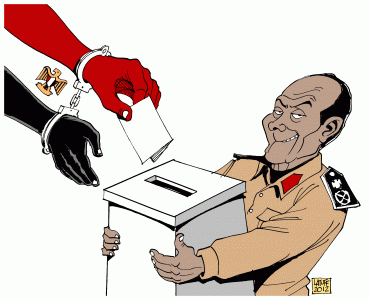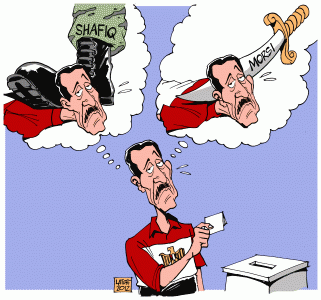This post is part of our special coverage of Egypt Elections 2011/2012.
On May 23 and 24, the eyes of the whole world were once again on Egypt as the country held its first presidential election after the huge popular uprising that brought down Hosni Mubarak a year and a half ago.
Around 660 candidates attempted to get approved (which led blogger Bassem Sabry to come up with a humorous list of those who were not running for presidency). The candidates included not only members of the Muslim Brotherhood and their Freedom and Justice Party (FJP), but also prominent members of the former regime (who are known as “felool” or “remnants”).
There ended up being 23 official candidates, ten of whom eventually got disqualified. Thus, 13 candidates in total, ranging from the “revolution's candidate” Khaled Ali to Mohamed Morsi, FJP's “spare tyre”, stood on May 23.
The final results are to be officially announced on May 29, but there was frenzied interest as polling stations were closing. Counting started immediately afterwards and results were released in real time on various TV channels and through several liveblogging outlets.
Reporting and counting
As during the parliamentary elections, widespread citizen monitoring of irregularities took place. Reports were constantly filed on various social networks. The claims of irregularities such as illicit campaigning were mainly attributed to supporters of FJP candidate Mohamed Morsi and former Prime Minister Ahmed Shafik.
Interest on Twitter, under the hashtags #EgyPresElection, #EgyElections, #EgyPresElex, was so great that people were already discussing and arguing while only 2% of the votes had been counted.
This led to jokes about the frenzy and the sleepless hours to come:
@bassem_sabry: Breaking: Hosni Mubarak wins by 99.9% of the votes.
@vicosalama: @bassem_sabry aahh the good old days. no stress involved :-)
Twitter users @Iyad El-Baghdadi and @GalalAmrG set up a collaborative document to keep track of results. I helped curate the final results by gathering the numbers released by news outlets Ahram Online and Aswat Masriya.
As the results were coming in, Mohamed Morsi and Ahmed Shafik were showing up as the candidates most likely to take part in the runoff on June 16 and 17. Unexpectedly, the Nasserist Hamdeen Sabahi made a spectacular leap:
The high number of votes he received has been one of the biggest surprises in this election, especially as Alexandria (generally a Muslim Brotherhood stronghold) and the Imbaba district in northern Cairo (traditionally a Salafi stronghold) voted heavily for Sabahi. He later dropped back to third place, where he remains according to the final count.@HaniShukrallah: URGENT URGENT: Sabbahi leaps to second place!
However, many boycotted the election because they felt it was undemocratic and would simply strengthen the hold of the military on the country.
The fears of many were confirmed by a statement allegedly made by Ahmed Shafik's spokesperson that “the revolution is over”.
The revolution isn't over
As the final counts were announced on the evening of May 25, reactions erupted on Twitter:
@MohAbdElHamid: If today proved one thing it would be that our predictions are bullshit. This revolution can't be predicted.
@DaliaEzzat_: Egyptians are forced to choose between two forms of fascism. For many, this won't be an easy decision. Huge consequences for both.
@Gsquare86: Organization is the key!! if we learned anything from Ikhwan [the Muslim Brotherhood] is that even if they are unpopular in the streets, their machine is working!
@shadihamid: The Brotherhood is always obsessed about preservation of the ‘tanzim,’ or organization. In that sense, it can already claim victory.
Many of the discussions were focused on a boycott of the runoff:
@glcarlstrom: Seems to me turnout will be even bigger factor in #egypt runoff – imagine there will be lots of unenthusiastic voters?
And although some have already decided to boycott the runoff vote as “unethical and shameful”, others believe this will be a huge mistake as it would mean votes silently going to Morsi.@RawahBadrawi: If there is ever a time to boycott, it's now. Voting for Morsi as a way of fulfulling the goals of the Revolution is an oxymoron.
In addition, the question has been raised about how much of the Shafik vote was made up by voters from Egypt's Coptic Christian minority. Although the Coptic church did not officially endorse a candidate, many Copts are fearful of the possibility of a Muslim Brotherhood member becoming president. Some people believe that Christian votes have pushed Shafik to the top, an idea dismissed as “misleading” and countered in a number of comments [ar].
As Aboul Fotouh, former Muslim Brotherhood member and in fourth place, seems to have denied backing Morsi, suggestions have spread about the possible coalitions that will form. Many have called for the recently amended political rights law (the “anti-felool” law) to be implemented, and for Shafik to be barred from running:
@Amany90: All Egyptian lawyers must unite NOW to get Shafiq out using the isolation law or the corruption charges. Get to work
@mfatta7: Shafiq's presence on the candidate list is legally controversial and he can be well disqualified by a court ruling before the run off.
@mfatta7: The SCAF [military] holds the key to the constitutional court which holds the key to banning Shafiq from race.
Right now many are oscillating between shock and fear, contemplating their worst-case scenarios, but others have been calling for the country to move forward in the name of all those who gave their lives for the revolution. And no, despite the possible outcome of this election, the revolution is not over: percentages show that 75% of Egyptians voted against a Muslim Brotherhood president and 60% against the return of the old regime.
This post is part of our special coverage of Egypt Elections 2011/2012.










3 comments
As they say here, Morsy is the first presidential candidate ever to run for presidency against his will, and people will vote for him in the run-off against their will.